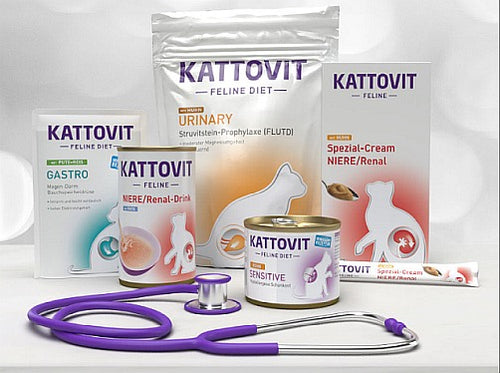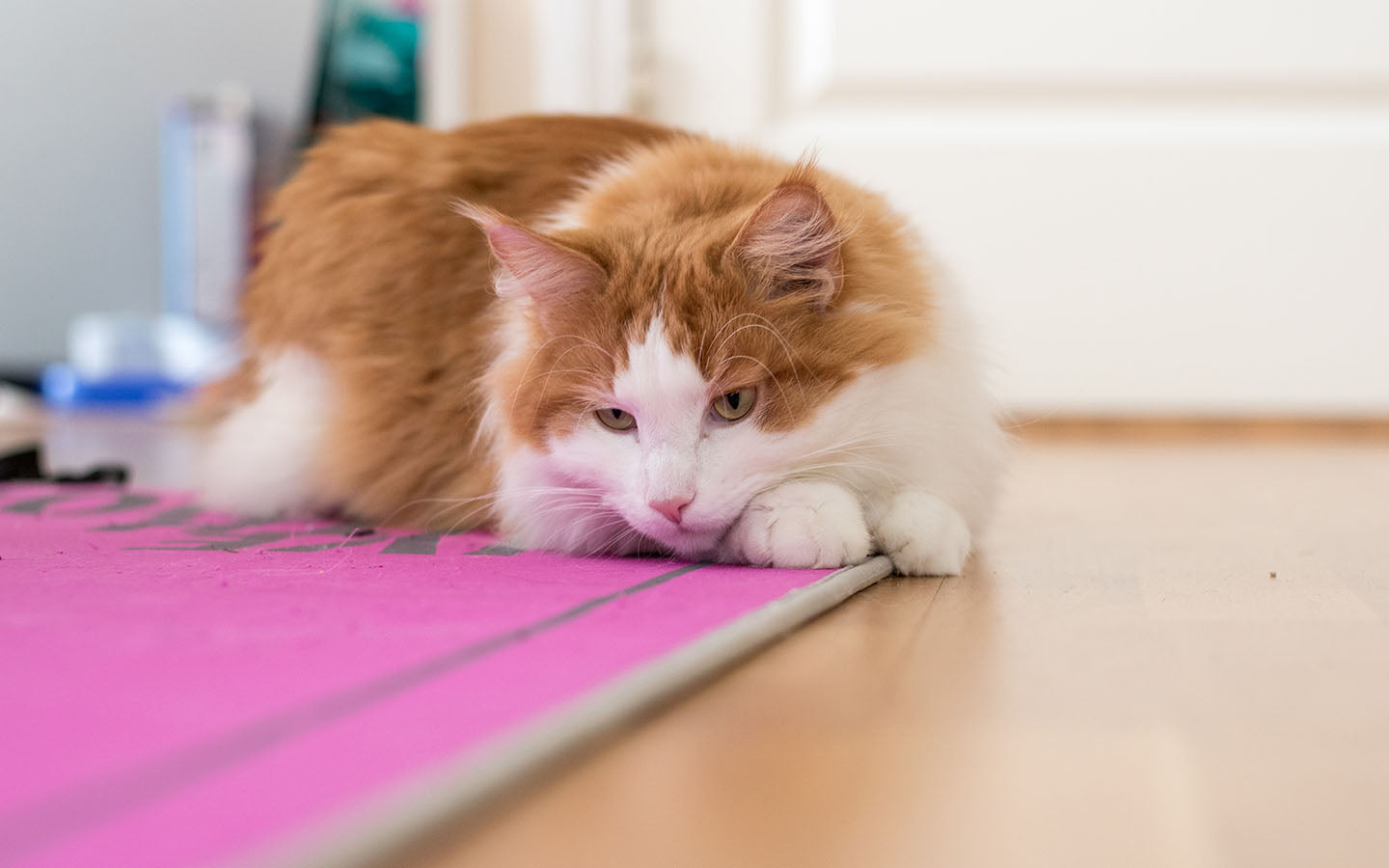Cat is apathetic – what you can do
Is your cat apathetic, hardly responds to being spoken to, seems tired and hardly moves? In this case, you should pay attention and observe and examine your cat closely. Apathy in cats manifests itself as a result of various life circumstances, Illnesses and injuries. In any case, apathy is a cause for concern and should be taken seriously. Find out here what apathy is exactly, what the possible triggers are and how you can help your apathetic cat.
What is apathy in cats?
The term apathy comes from ancient Greek and means something like "insensitivity". In German, the term "indifference" is very close to the meaning of apathy. Apathetic cats appear uninvolved, communicate and move little, and hardly react when spoken to or when attempts are made to interact. Apathy is often accompanied by lethargy. Lethargy describes physical and mental sluggishness and a great need for sleep. Apathetic cats are usually tired and exhausted - a condition that can be made worse by accompanying symptoms.
[Aufbaukur]
accompanying symptoms of apathy
Apathetic cats are rarely exclusively apathetic. They usually show other Symptoms that depend on the underlying cause. The following symptoms often occur in combination with apathy:
- loss of appetite and refusal to drink
- tiredness and exhaustion
- Diarrhea
- Vomit
- Fever
- Pains
Loss of appetite and reduced thirst are particularly common in apathetic cats. As a result, the animals do not consume enough nutrients and liquids, which weakens them further. A lack of appetite and drinking ultimately leads to dangerous dehydration in cats. Symptoms such as diarrhea and vomiting accelerate this development even further. As soon as you notice that your cat is not eating or drinking enough, you should consult a veterinarian.
The exact symptoms that accompany apathetic traits in a cat depend primarily on the cause of the apathy. The same applies to the appropriate treatment. Therefore, the first step is to find out what the possible triggers of the apathy are.
Causes of Apathy in Cats
If your cat is apathetic, you can be pretty sure that something is wrong. Most likely, a cat disease or injury is behind the symptom. You should therefore take your apathetic cat to the vet as soon as possible to clarify the cause and have your furry friend treated.
There are various possible causes for your cat's apathetic state, for example:
- injuries
- infections
- poisoning
- cardiovascular disease
- old age
- feline distemper
- cat flu
Internal or external injuries
If your cat has sustained internal or external injuries as a result of an accident or a territorial fight, it is probably in great pain. If bacteria enter a wound, this can also lead to an infection with symptoms such as fever. This in turn leads to apathy in many cats. Even if the internal organs are injured in a potentially life-threatening manner, the cat can fall into an apathetic state.
If you hear of an accident or fight involving your cat, you should observe the animal closely afterwards and check for possible wounds and injuries. This is especially true for outdoor cats, who often compete with other animals on their roaming tours and are exposed to risks. Internal injuries are comparatively difficult to detect. The first signs of this can be sensitivity to pain when certain parts of the body are touched, aggression and withdrawal behavior. The best thing to do after an accident is to play it safe and have the animal examined by a vet.
infections
An infection with bacteria and viruses – for example a Gastrointestinal infection – can also cause apathy. Bacterial or viral infections are often accompanied by fever, which weakens the cat and makes it listless. Fever in cats begins at a body temperature of 39.2 °C and becomes extremely dangerous at 41 °C at the latest. If you want to determine your cat's temperature, you should take the measurement rectally, as other measuring locations are not accurate enough. You can find out more about taking a temperature in our Fever Guide .
poisoning
As a result of poisoning, cats usually react with apathy, vomiting, diarrhea, excessive salivation and often an unsteady or even staggering gait. Possible toxins include certain plants (e.g. agave, hydrangea or orchid), lead from batteries, paint or toys, medication (e.g. a dropped painkiller), certain foods or poison bait for other animals such as rats or snails.
However, poisoning can also cause an acute and dangerous Kidney failure can occur. In this case, quick action is vital: at the first signs, the cat should be examined and treated by a vet. The more information you can give them about possible sources of poisoning, the easier it will be to diagnose and treat.
If there is kidney failure, food plays an important role alongside medication from the vet. Special food for cats with kidney disease like our KATTOVIT Kidney/Renal series is low in sodium and phosphorus and relieves the kidneys.
cardiovascular disease
Cardiovascular diseases can also put cats into an apathetic state. If your cat also has pale to bluish mucous membranes, this could indicate a problem with the heart. A circulatory disorder in the brain, even a stroke, can also trigger apathy. Other signs of a stroke include an unsteady gait, disorientation, pupils of different sizes, a noticeably tilted head, vision problems and uncontrolled movements of the limbs, even paralysis. You should not waste any time here and contact your veterinarian or a veterinary clinic immediately.
old age
A relatively harmless explanation for your cat's apathy may be its advanced age. As they get older, cats, like humans, sometimes show symptoms of old age. These include progressive loss of hearing and vision, loss of appetite, confusion and mishaps such as urinating in the house. Due to these developments, particularly limited vision and hearing, affected cats often appear apathetic, are less active and hardly respond when spoken to. In this case, it does not necessarily have to be a serious cat disease. The age of the cat can also trigger these behavioral changes. To be on the safe side, you should still have your cat examined by a veterinarian - after all, the risk of numerous diseases increases with age and it cannot be ruled out that something serious is behind the symptoms.
feline distemper
Feline panleukopenia is a highly contagious and life-threatening viral disease. The disease can progress in three different ways:
- Peracute course: The peracute course of feline distemper is very insidious. Affected cats show no symptoms until sudden death occurs a few hours after the onset of infection.
- Acute course: In the acute course of panleukopenia, the animals are usually tired, exhausted and apathetic. They suffer from loss of appetite, diarrhea, vomiting, fever, refuse to drink and have dull fur. The animals become increasingly dehydrated and can develop a fever of up to 41 °C. Without appropriate countermeasures, a state of shock sets in after a while, which ultimately leads to death.
- Subacute course: If the cat plague is subacute, the symptoms mentioned above, such as diarrhea and vomiting, are less pronounced. The lack of white blood cells (so-called leukopenia) that accompanies the cat's disease weakens the cat's immune system and makes it susceptible to other dangerous infections. In the long term, the latter can also cause the cat's death.
At the first signs of feline distemper, you should go to the vet immediately. The vet will carry out blood and stool tests and can give the sick animal an infusion to absorb fluids and important electrolytes. Antiemetics, for example, can help to prevent vomiting. In severe cases, a blood transfusion may also be necessary.
To prevent this insidious cat disease, you can have your cat vaccinated prophylactically. The first vaccination should be given when the cat is a few weeks old and then regularly refreshed.
cat flu
Another highly contagious disease is the so-called cat flu. This can be caused by various bacteria and viruses and can be fatal. Young cats and kittens are particularly susceptible to this disease. Typical symptoms include apathy and Nasal discharge , sneezing, loss of appetite, fever, and watery and sticky eyes. Healthy cats have a good chance of recovery with appropriate treatment. Weaker animals can, however, also die from cat flu.
Depending on the cause, the veterinarian should treat with antiviral drugs or antibiotics, administer anti-inflammatory drugs if necessary and strengthen the cat's immune system.
As a preventative measure, you can have your cat vaccinated against some of the pathogens that cause cat flu. Although this does not offer 100% protection, it does reduce the risk of contracting cat flu.
What to do if the cat is apathetic?
If your cat is apathetic, barely responds to being spoken to and shows no appetite, you should observe it closely and take some measures:
- Check your cat for signs of external or internal injuries or poisoning, and for abnormal discoloration of its mucous membranes (e.g. bright red, very pale, or bluish). If you have a thermometer, you can also take your cat's temperature.
- Try to counteract your cat's refusal to eat and encourage them to drink. Mix additional water into the dry and wet food, use drinking fountains or water features, or use tasty drinks and creams.
- Keep your cat away from other house cats and animals. If a bacterial or viral infection such as cat flu or cat plague is present, it can easily be transmitted to other animals. If you suspect this, isolate the sick cat and disinfect all surfaces, drinking and feeding bowls, the litter box, etc.
- Go to the vet. If you notice an acute injury or poisoning or if dangerous symptoms such as vomiting and diarrhea appear, you should see a vet as soon as possible. If your pet's apathetic state does not improve and it continues to refuse to eat or drink, you should definitely see a doctor to prevent dehydration and other serious consequences.
- Nurture your cat back to health. Once your cat has been diagnosed and treated by a vet, it will need time to recover. As a result of the exertion and lack of appetite, it may have lost weight and become weak.
Our KATTOVIT Aufbaukur, with its particularly high energy content, was specially developed to help injured, sick and underweight cats get back on their feet. The tasty recipe is easy to digest and a small amount covers your cat's daily needs.









